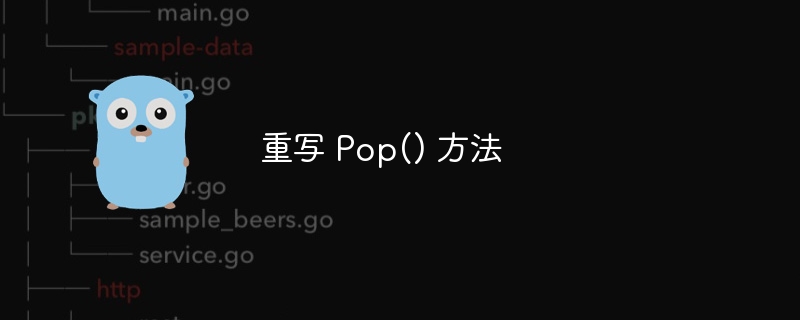Heim >Backend-Entwicklung >Golang >Überschreiben der Pop()-Methode
Überschreiben der Pop()-Methode
- WBOYWBOYWBOYWBOYWBOYWBOYWBOYWBOYWBOYWBOYWBOYWBOYWBnach vorne
- 2024-02-10 17:18:07584Durchsuche

Der PHP-Editor Banana stellt Ihnen heute vor, wie Sie die Pop()-Methode neu schreiben. In der Programmierung wird die Methode Pop() verwendet, um das letzte Element eines Arrays zu entfernen und zurückzugeben. Manchmal müssen wir jedoch die Pop()-Methode anpassen, um bestimmte Anforderungen zu erfüllen. Durch Überschreiben der Pop()-Methode können wir zusätzliche Logik hinzufügen oder die zurückgegebenen Elemente ändern, damit sie besser zu unserem Code passen. In diesem Artikel wird detailliert beschrieben, wie die Pop()-Methode überschrieben wird, und es werden einige Beispiele zum besseren Verständnis gegeben. Lasst uns beginnen!
Frageninhalt
Unter der Installation von go gibt es ein Beispiel für eine Prioritätswarteschlange in container/heap/example_pq_test.go
Ich füge den Inhalt der gesamten Datei ein, damit ich die Methode pop() fragen kann.
// copyright 2012 the go authors. all rights reserved.
// use of this source code is governed by a bsd-style
// license that can be found in the license file.
// this example demonstrates a priority queue built using the heap interface.
package heap_test
import (
"container/heap"
"fmt"
)
// an item is something we manage in a priority queue.
type item struct {
value string // the value of the item; arbitrary.
priority int // the priority of the item in the queue.
// the index is needed by update and is maintained by the heap.interface methods.
index int // the index of the item in the heap.
}
// a priorityqueue implements heap.interface and holds items.
type priorityqueue []*item
func (pq priorityqueue) len() int { return len(pq) }
func (pq priorityqueue) less(i, j int) bool {
// we want pop to give us the highest, not lowest, priority so we use greater than here.
return pq[i].priority > pq[j].priority
}
func (pq priorityqueue) swap(i, j int) {
pq[i], pq[j] = pq[j], pq[i]
pq[i].index = i
pq[j].index = j
}
func (pq *priorityqueue) push(x any) {
n := len(*pq)
item := x.(*item)
item.index = n
*pq = append(*pq, item)
}
func (pq *priorityqueue) pop() any {
old := *pq
n := len(old)
item := old[n-1]
old[n-1] = nil // avoid memory leak
item.index = -1 // for safety
*pq = old[0 : n-1]
return item
}
// update modifies the priority and value of an item in the queue.
func (pq *priorityqueue) update(item *item, value string, priority int) {
item.value = value
item.priority = priority
heap.fix(pq, item.index)
}
// this example creates a priorityqueue with some items, adds and manipulates an item,
// and then removes the items in priority order.
func example_priorityqueue() {
// some items and their priorities.
items := map[string]int{
"banana": 3, "apple": 2, "pear": 4,
}
// create a priority queue, put the items in it, and
// establish the priority queue (heap) invariants.
pq := make(priorityqueue, len(items))
i := 0
for value, priority := range items {
pq[i] = &item{
value: value,
priority: priority,
index: i,
}
i++
}
heap.init(&pq)
// insert a new item and then modify its priority.
item := &item{
value: "orange",
priority: 1,
}
heap.push(&pq, item)
pq.update(item, item.value, 5)
// take the items out; they arrive in decreasing priority order.
for pq.len() > 0 {
item := heap.pop(&pq).(*item)
fmt.printf("%.2d:%s ", item.priority, item.value)
}
// output:
// 05:orange 04:pear 03:banana 02:apple
}
Wenn ich eine pop()-Methode wie unten habe (ohne eine tiefe Kopie des Original-Slice zu erstellen), welchen Schaden könnte das anrichten oder liegt da ein Trugschluss vor?
func (pq *PriorityQueue) Pop2() any {
n := len(*pq)
item := (*pq)[n-1]
(*pq)[n-1] = nil // avoid memory leak
item.index = -1 // for safety
*pq = (*pq)[: n-1]
return item
}
Ich glaube, dass die ursprüngliche pop()-Methode, die old := *pq schneidet, eine tiefe Kopie erstellt (ein neues zugrunde liegendes Array zuweist). ist das echt? pop() 方法,这一行为切片 old := *pq 创建一个深层副本(分配一个新的底层数组)。这是真的吗?
解决方法
make函数创建的对象,这里是map和sliceLösung
Die von der Funktion make erstellten Objekte, hier map und slice, sind eher Zeiger auf Datenspeicherorte als die Daten selbst. So old := *pq
verhält sich eher wie ein
Das obige ist der detaillierte Inhalt vonÜberschreiben der Pop()-Methode. Für weitere Informationen folgen Sie bitte anderen verwandten Artikeln auf der PHP chinesischen Website!

